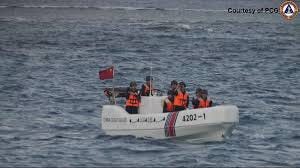Philippines Accuses China of Harassing Fisheries Vessels in Disputed South China Sea
MANILA, Philippines (AP) — Philippine authorities have accused Chinese forces of harassing a group of Philippine fisheries vessels conducting a scientific survey in the South China Sea, a region both countries claim. The harassment, which led to the cancellation of the survey, involved Chinese coast guard ships and a Chinese navy helicopter, according to the Philippine Coast Guard.
China has long asserted control over most of the South China Sea, a strategic and resource-rich waterway, and has accused other nations, including the Philippines, Vietnam, and Malaysia, of encroaching on its claimed territory. Beijing marks its territorial claims with a "nine-dash line" on maps, although the exact coordinates of its claims remain unclear.
The harassment took place on Friday near Sandy Cay, a group of small uninhabited sandbars located between a Chinese-controlled artificial island and a Philippine-occupied island in the Spratly Islands. The Philippine Coast Guard reported that Chinese coast guard ships approached two larger Philippine vessels, prompting them to maneuver to avoid a collision. Additionally, a Chinese navy helicopter flew dangerously low over two smaller Philippine boats, leading to the cessation of the survey.
Videos released by the Philippine Coast Guard show one Chinese coast guard vessel sailing very close to a Philippine ship. Another video shows a Chinese military helicopter hovering over the sea near a Philippine-flagged vessel.
At the time of the incident, Chinese officials had yet to provide any comment.
The latest confrontation in the South China Sea highlights the ongoing territorial disputes in one of the world's most crucial trade and security routes. The tensions could also challenge the United States' role in countering China's growing assertiveness in the region. Under President Joe Biden, the U.S. has strengthened security alliances in Asia, aiming to curb China's influence, especially in the South China Sea, East China Sea, and around Taiwan — an island that Beijing views as a breakaway province it aims to reclaim by force if necessary.
On Wednesday, U.S. Secretary of State Marco Rubio discussed the issue with Philippine Foreign Minister Enrique Manalo. The U.S. condemned China's actions as destabilizing and contrary to international law, reiterating America's commitment to defend the Philippines under the Mutual Defense Treaty.
While the U.S. has repeatedly warned China about its behavior in the region, Beijing maintains that the South China Sea dispute is a matter for Asian countries to resolve without external interference.
This is not the first time Chinese forces have clashed with Philippine authorities in the South China Sea. In 2017, China accused the Philippine military of secretly planning to build on one of the disputed sandbars near Thitu Island. Although tensions were defused through diplomatic negotiations, Chinese ships have continued to monitor the area.
In addition to the dispute near Sandy Cay, the Philippine Coast Guard reported that Chinese ships have been encroaching on the Scarborough Shoal, another contested area about 124 nautical miles from the Philippines. Despite orders from the Philippines to stay away, Chinese coast guard ships have come as close as 60 nautical miles to the Philippine coast, well within the country's exclusive economic zone.
The Philippine Coast Guard has insisted that these waters are part of the Philippines' exclusive rights to exploit resources, but Chinese forces have dismissed the orders, claiming the area lies within China's territorial waters.
The ongoing tensions in the South China Sea show no signs of abating, with both nations continuing to assert their territorial claims. The situation remains volatile, with the potential for further clashes as regional powers vie for control over the strategically important waterway.


